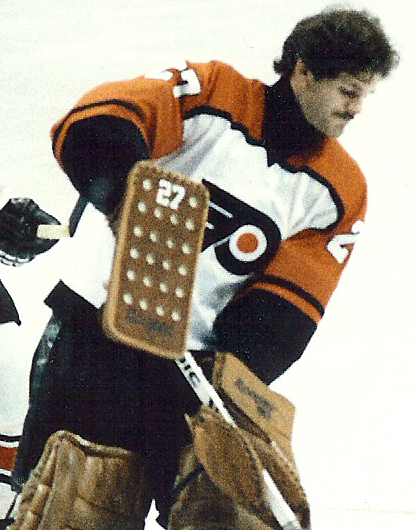
Ron Hextall
The NHL 1987 Stanley Cup Final should have been a runaway win for Edmonton. The mighty Oilers came into the Final with a league-leading 106-point regular season. To reach the final round, the Oilers knocked off the Los Angeles Kings 4-1, then swept the Winnipeg Jets 4-0, and then polished off the Detroit Red Wings 4-1. Edmonton, an offensive juggernaut led by living legend Wayne Gretzky, was rested, healthy and in a groove, having lost only two games in the playoffs.
The story was different for its Stanley Cup Final opponent. The Philadelphia Flyers limped into the final round. With a very respectable 100-point season, the Flyers had a much tougher road to the final round than the Oilers. Philadelphia beat the New York Rangers 4-2 in the Division Semifinals, slipped past the New York Islanders 4-3 in the Division Finals, and took care of the Montreal Canadiens 4-2 in the Conference Finals. In the process, however, the Flyers had lost their top scorer, Tim Kerr, and team captain Dave Poulin played with cracked ribs.
On paper, the 1987 Stanley Cup Final figured to be a cakewalk for Edmonton. It turned out to be anything but.
- Game 1 took place on May 17 in Edmonton. Predictably, Gretzky kicked off the scoring with a first-period goal, going top shelf against rookie goalie Ron Hextall. Philly tied it with a second-period goal by Brian Propp, but Edmonton stormed back with three goals in the third to win 4-2. The Flyers outshot the Oilers 31-26, which was a pretty good indication that Philadelphia had come to play.
- Game 2 was played in Edmonton on May 20. Again, the Oilers jumped out to a 1-0 lead, again on a second-period goal by Gretzky. This time, however, the Flyers bounced back to take their first lead in the series, with second-period goals by Derrick Smith and Propp. Glenn Anderson made it 2-2 with a goal midway through the third, sending the game into overtime. Edmonton got a goal by Jari Kurri in OT to win 3-2. Shots were 34-34.
- The series shifted to Philadelphia for Game 3 on May 22. The Flyers were down 2-0 in the series — a very deep hole indeed, particularly against a team like the Oilers. When Edmonton went up 3-0 less than two minutes into the second period, a lot of people might have thought the Flyers were doomed. No team had ever come back from 3-0 to win a game in the Final, but that was about to change. Philadelphia roared back with five unanswered goals for a 5-3 victory, outshooting the Oilers 36-28. About now the Oilers may have felt like Apollo Creed facing Rocky.
- Game 4 took place in Philly on May 24. Once again, Edmonton jumped out to an early lead, going up 2-0 in the first period. The Flyers managed one goal in the second, but Edmonton put two more on the board to take the game handily, 4-1, despite outshooting the Flyers only 29-28. Philadelphia was down 3 games to 1, with its back firmly against the wall.
- The series returned to Edmonton on May 26 for Game 5. Yet again, the Oilers jumped out to a 2-0 lead, with goals from Kurri and Marty McSorley in the first period. Philly also got on the board in the first with a goal from Rick Tocchet, and the game was 3-3 going into the third period. Five minutes into the third, Tocchet scored again, helping the amazingly resilient Flyers to an unexpected 4-3 win and cutting the series deficit to 3-2. The Flyers outshot the Oilers 35-34.
- Game 6 was played on May 28 in Philadelphia. Believe it or not, Edmonton took a 2-0 lead, with first-period goals by Kevin Lowe and Kevin McClelland. Your average team might have given up at this point, but not the Flyers. Philadelphia got a goal in the second from Lindsay Carson, and two more — from Propp and J.J. Daigneault — in the third. Final score: 3-2, Flyers, despite being outshot 32-23. The series was going the distance.
- Game 7 was in Edmonton on May 31. This was the first seventh game in a Stanley Cup Final since 1971. For the first time in the series, the Flyers scored first, on an early first-period goal by Murray Craven. Mark Messier’s goal tied the game shortly thereafter, and with scores from Kurri and Anderson, the Oilers went on to win the game 3-1, capturing their third Stanley Cup. Edmonton’s offense was just too much, and the game stayed close mainly because Hextall made 40 saves for the Flyers. The Oilers defense was stellar in this game, too, by holding Philly to only 20 shots. Hextall’s superb performance throughout the playoffs would earn him the Conn Smythe Trophy (Stanley Cup Playoffs MVP).
The Oilers of this era were one of the greatest hockey teams ever assembled, but sometimes going against a great opponent brings out the best in another team. That’s certainly what happened with the Flyers in the 1987 Stanley Cup Final, and if there is such a thing as a good defeat, this was it. Edmonton would go on to win four more championships in the next five seasons.
(Image credit – Wikimedia Commons)
